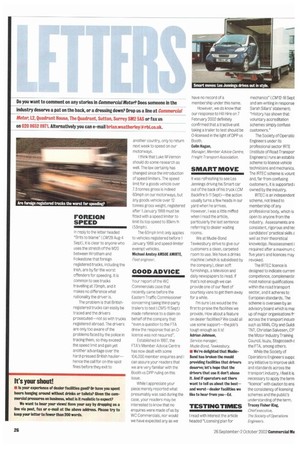TESTING TIMES
Page 26

If you've noticed an error in this article please click here to report it so we can fix it.
I read with interest the article headed "Licensing plan for
mechanics" (CM12-18 Sept and am writing in response Sarah Sillars' statement: "History has shown that voluntary accreditation schemes simply confuse customers."
The Society of Operatio Engineers under its professional sector IRTE (Institute of Road Transpor Engineers) runs an establis scheme to licence vehicle technicians and mechanics, The IRTFC scheme is volunt and, far from confusing customers, it is supported ; owned by the industry.
IRTEC is an independent scheme, not finked to membership of any professional body, which is open to anyone from the industry. Assessments are consistent, rigorous and te; candidates' practical skills well as their theoretical knowledge. Reassessment i required after a maximum c five years and licences may revoked.
The IRTEC licence is designed to indicate current competence, complementir most national qualifications within the road transport sector, and it adheres to European standards. The scheme is overseen by an advisory board which is mac up of major organisations fr across the transport industr such as MAN, City and Guild: TNT, Christian Salvesen, CP the Motor Industry Training Council, lsuzu. Stagecoach 2 the ETA, among others.
While the Society of Operations Engineers suppc any initiative to improve skill: and standards across the transport industry, I feel it is necessary to apply the term "licence" with caution to ens the consistency of licensing schemes and the public's understanding of the term. Tracey fisher !Eng, Chief executive,
























































































































































